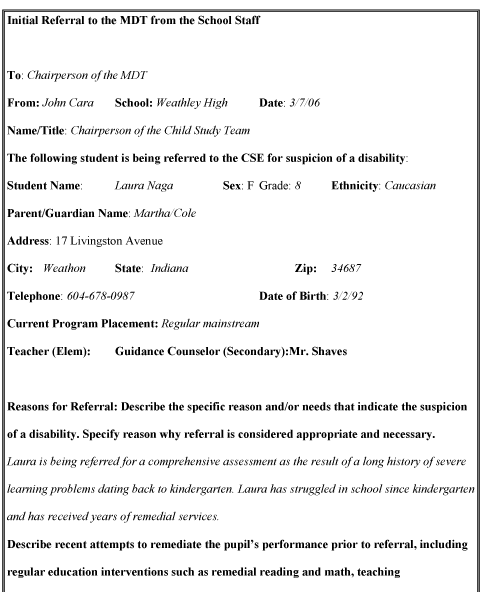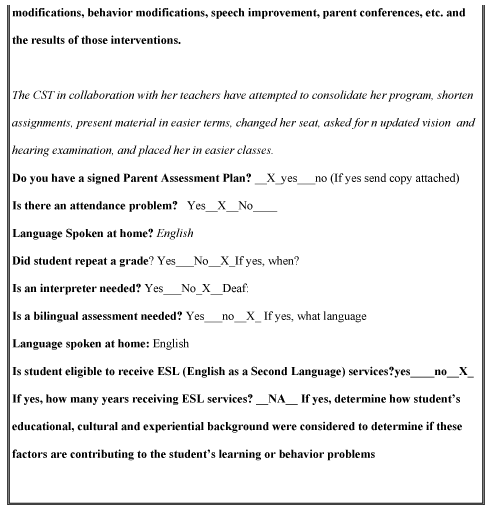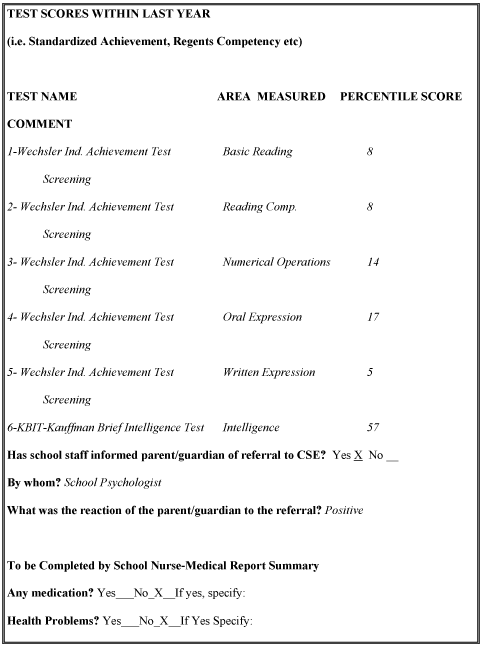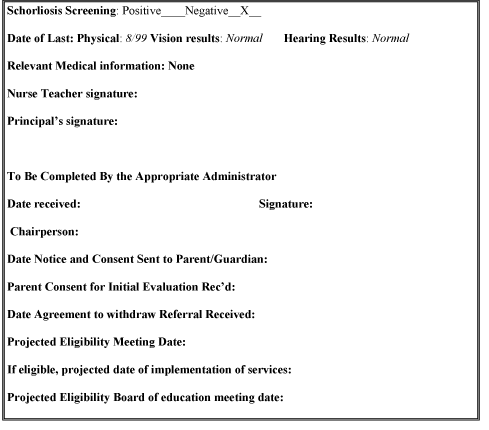Introduction
A variety of assessment tools and strategies are used to gather relevant functional, academic and developmental information about the child, including information provided by the parent. This information will be used to determine whether the child has a disability, the child’s present levels of academic achievement and functional performance, and if eligible for special education and related services, the content of the child’s IEP. This part of the Assessment in Special Education Series will assist you in understanding these requirements.
A – Understand the responsibilities of the Team that is assigned to do the comprehensive assessment: The Multidisciplinary Team (MDT)
Now that the Child Study Team has exhausted all its options and the student is still exhibiting high risk symptoms, a more formal comprehensive evaluation will take place to determine if the child has an educational disability that is causing the lack of educational performance. However, you should understand that other people other than the CST have the right under due process to initiate a formal referral for a child with a suspected disability. Depending on state regulations, these could include:
- The child’s parent and advocate or person in parental relationship
- Any classroom teacher
- An officer of the court
- Any professional staff member of the public or private school district
- A student on his or her own behalf if he/she is 18 years of age or older, or an emancipated minor- a person under the age of 18 years of age who has been given “certain adult rights” by the court.
- The Chief School Officer of the State or his designee responsible for welfare, education or health of children.
This referral from the CST, sometimes called the Initial Referral to the Multidisciplinary Team from the School Staff, will include a great deal of information to assist the MDT in their assessment. Along with this referral, the CST will attach documentation as to why a possible disability exists, descriptions of attempts to remediate the child’s behaviors (pre-referral strategies) or performance prior to the referral.
Prior to any assessment, the MDT must secure an agreement by the parent to allow the members of the team to evaluate the child. This release is part of the assessment plan and should, according to IDEA 2004) do the following:
- Be in a language easily understood by the general public
- Be provided in the primary language of the parent or other mode of communication used by the parent, unless to do so is clearly unfeasible
- Explains the types of assessments to be conducted
- State that no individualized educational program (IEP) will result from the assessment without the consent of the parent
- No assessment shall be conducted unless the written consent of the parent is obtained prior to the assessment. The parent shall have at least 15 days (may vary from state to state) from the receipt of the proposed assessment plan to arrive at a decision. Assessment may begin immediately upon receipt of the consent.
- The copy of the notice of parent rights shall include the right to electronically record the proceedings of the eligibility committee meetings
- The assessment shall be conducted by persons competent to perform the assessment, as determined by the school district, county office, or special education local plan area
- Any psychological assessment of pupils must be conducted by a qualified school psychologist
- Any health assessment of pupils shall be conducted only by a credentialed school nurse or physician who is trained and prepared to assess cultural and ethnic factors appropriate to the pupil being assessed.
B – Understand the Membership of the Multidisciplinary Team (MDT)
According to Pierangelo & Giuliani (2006), while specific state regulations may differ on the membership of the MDT, the members are usually drawn from individuals and professionals within the school and community:
- School Psychologist: The role of the school psychologist on the MDT involves the administration of individual intelligence tests, projective tests, personality inventories, and the observation of the student in a variety of settings.
- School Nurse: The role of the school nurse is to review all medical records, screen for vision and hearing, consults with outside physicians, and may refer to outside physicians if necessary.
- Classroom Teacher: Works with the local school based Child Study Team to implement pre-referral strategies, plans and implements, along with the special education team, classroom strategies that create an appropriate working environment for the student.
- School Social Worker: The social worker’s role on the MDT is to gather and provide information concerning the family system. This may be accomplished through interviews, observations, conferences etc.
- Special Education Teacher: The role of this individual includes consultation to parents and classroom teachers about pre-referral recommendations, administers educational and perceptual tests, may be called upon to observe the student in a variety of settings, may be involved in the screening of students with suspected disabilities, writes IEP’s including goals and objectives and recommends intervention strategies to teachers and parents.
- Educational diagnostician: Administers a series of evaluations including norm-referenced and criterion referenced tests, observes the student in a variety of settings, makes educational recommendations that get applied to the IEP as goals and objectives.
- Special education supervisor
- Physical Therapist: The physical therapist is called upon to evaluate a child who may be experiencing problems in gross motor functioning, living and self help skills, and vocational skills necessary for the student to be able to function in certain settings. This professional may be used to screen, evaluate, provide direct services or consult with the teacher, parent or school.
- Behavioral consultant: This individual works closely with the team in providing direct services or consultation on issues involving behavioral and classroom management techniques and programs.
- Speech/Language clinician: This professional will be involved in screening for speech and language developmental problems, be asked to provide a full evaluation on a suspected language disability, provide direct services, and consult with staff and parents.
- Audiologist: This professional will be called upon to evaluate a student’s hearing for possible impairments and as a result of the findings may refer the student for medical consultation or treatment. The audiologist may also assist in helping students and parents obtain equipment i.e. hearing aids that may impact on the child’s ability to function in school.
- Occupational Therapist: The occupational therapist is called upon to evaluate a child who may be experiencing problems in fine motors skills and living and self help skills, This professional may be used to screen, evaluate, provide direct services, consult with the teacher, parent or school and assist in obtaining the appropriate assistive technology or equipment for the student.
- Guidance Counselor: This individual may be involved in providing aptitude test information, provide counseling services, work with the team on consolidating, changing, or developing a student’s class schedule, and assist the Child Study Team in developing pre-referral strategies.
- Parents: The parents plays an extremely important role on the MDT in providing input for the IEP, working closely with members of the team, and carry out, assist, or initiate academic or management programs within the child’s home.
When a suspected disability is determined, the CST team may fill out a form like the one below.




Once this form is filled in by the Child Study Team it is forwarded to the chairperson of the IEP Committee (also known as the Committee on Special Education or the Eligibility Committee). At this point, the chairperson becomes aware that a student with a suspected disability may be coming to the IEP team for a review and also sends out a letter to the parent indicating that a comprehensive evaluation will take place as per their written consent. The letter will also include the parent’s rights and any other legal information necessary according to due process.
If a release for testing (assessment plan) is not secured at a separate meeting, usually at the initial parent intake, the chairperson of the MDT will mail one to the parent along with the letter indicating that a referral has been made. However, no formal evaluations may begin until the district has received signed permission from the parent or guardian. Keep in mind that this referral for a comprehensive assessment can also emanate from the parent. This form is sometimes called the Initial Referral to the Multidisciplinary Team from the Parent.
Once all the paper work is received, and the proper legal papers are signed by the parents the team can begin the comprehensive evaluation which includes formal (standardized) and informal (nonstandarized ) forms of assessment. The various methods of assessment will be discussed in the next step.
Download a PDF Version of this Issue
To download a PDF file version of this issue of Assessment in Special Education Series – CLICK HERE

